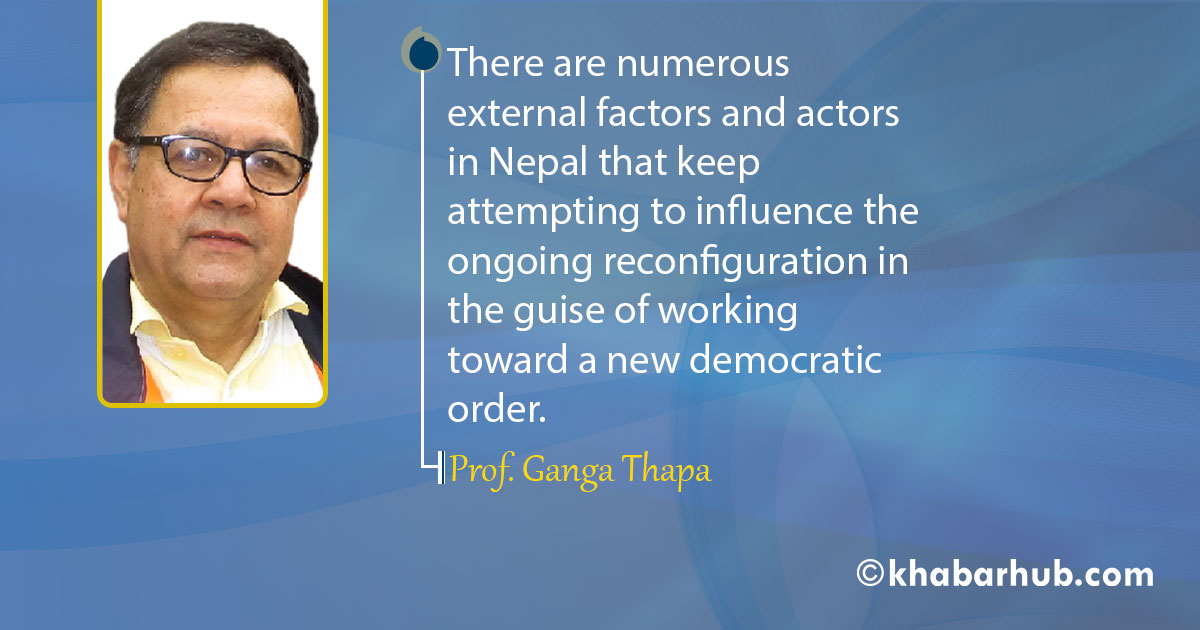In this episode, I would like to identify, explicate, and analyze postcolonial democracies of South Asia which might be summarized in terms of emphasizing contemporary philosophy and practices shared widely over the last 70 years or so. But it should be remembered that while India may have been a neighbor that sincerely sought the stability and prosperity of Nepal, the image of Indian leaders is gradually being tarnished.
It is obvious that India, the ex-British colony had not long ago imposed for 13 months economic blockade on a non-colonial neighbor that began on 23 September 2015 just three days after the promulgation of the new constitution in Nepal—effectively blocking all essential goods, including medicines, over its displeasure on the new constitution at a time when Nepal was already struggling to recover from the devastating quake on 25 April 2015 and it continued through the harsh winter months that increased further people’s agony and dissatisfaction.
Turning specifically to the blockade, it was a wrong choice initiated by India’s established interests supposedly to ensure democratic stability; it may now be considered as a bad bet that directly challenged the age-old Nepal-India ties.
Despite such torturous but unavoidable episodes, it is believed even now that the two countries are more than just neighbors and their relationship is still ‘special.’ India had imposed an economic embargo on Nepali people although there was room for deliberations. Indeed, gone are the generous offers of economic assistance, the hefty contributions made out sometimes to camouflage greed and arrogance, which may now be understood as gross violations of the established principles of democracy to maintain direct control due to conservative disposition; as a result, Nepal had to face harsh conditions.
We can, however, support a more modest claim for our present purposes that the new constitution had the support of more than 90 percent votes of the elected Constituent Assembly (CA)—unquestionable progress since more than 25 years after the fall of the feudal monarchy.
It also ended the long period of political transition and armed struggle. It intended to promote positive democratic governance which, in turn, may lead to higher participation of the people.
Besides, there are several events the legitimacy of which is dubious from an egalitarian point of view. India’s attempt to block the promulgation of the constitution although it was ‘particularly relevant for political stability in the aftermath of violent conflict’ through the foreign secretary Jai Shanker and other tactics and approaches that bred huge tensions for the first time since 1990 amounted to what I term a myopic approach bound to long-term problems that remind me of the historical designs of British India to embed their stakes deeper into Nepal’s politics rather than sanitize it and work together.
As in the past, Delhi’s apprehensive reaction was not only intended to maintaining its influence as before; it also showed how a state in the neighborhood could become the target of hubris and inordinate self-interest. It also offered a telling specimen of how a small state becomes vulnerable to coercion by a big power even in the course of its delicate political transition.
Turning specifically to the blockade, it was a wrong choice initiated by India’s established interests supposedly to ensure democratic stability; it may now be considered as a bad bet that directly challenged the age-old Nepal-India ties.
In some ways, the new constitution may not be having an entirely participative character with the full range of principles, values, regarded as central to a genuinely democratic polity found in advanced democracies.
Briefly summarizing, the manifestation of India’s reservations with the new constitution through the economic blockade was clearly made for the purpose of stifling democracy; it was made to systematically subvert it to serve inappropriate political ambitions and became painful, even shameful and inhuman practice. Indeed, the people of Nepal have to rely on India in order to manage their day-to-day life, but to punish Nepal for ignoring Delhi’s advice on altering Nepal’s constitution was an open interference by a state in another’s affairs which made the people furious.
Since then, the question of how long such a relationship may survive has become increasingly intriguing. While we may not have factored everything beneficial into Nepal-India relations, the anti-Indian public sentiments of that time may be still behind shaping Nepal’s democratic transition. The circumstances, however, are quite different now.
Even if one may not give a more coherent explanation, differences between Delhi and Kathmandu grew more noticeably after India’s direct engagement in altering Nepal’s Constitution because it failed to evince the quality of a good neighbor. In some ways, the new constitution may not be having an entirely participative character with the full range of principles, values, regarded as central to a genuinely democratic polity found in advanced democracies.
But, the constitution was an outcome of 10-year arduous transition and two assembly elections; it embodied cardinal principles such as federalism, republicanism, secularism, social inclusion, and pluralism that bring in a unified authority. It also ended the long period of political transition and armed struggle. It intended to promote positive democratic governance which, in turn, may lead to higher participation of the people.
But, an assertive and nationalist China could bear profound implications for the region’s stability, which may also create a new range of problems for Kathmandu.
Besides, its social and economic objectives form the source of its political legitimacy. In fact, one may also recall that India had imposed such economic blockades in 1969 and 1989, which have not faded yet from the public memory, whereas the other powerful neighbor China, considered the historic goings-on, including the abrogation of the monarchy, as Nepal’s internal matters.
There is little doubt that the individual character of each society helped determine the ultimate impact in creating new forms of socioeconomic and political control and organize new strategies for survival. When we look back at the 1950 year when the era of a constitutional monarchy was ushered, not possible without the Government of India’s support to King Tribhuvan who went for political asylum in Delhi. This brought the collapse of the Rana oligarchy. By and large, it was the inter-party quarrels and their failure to unite and formulate a functioning rule of the democratic political game that opened a long, new phase of political instability undoing the process of democratic consolidation.
In fact, Nepal had become a fertile ground for a rivalry between India and China after November 2005 ever since the agreement to end the country’s decade-long civil war in which Maoist insurgents had battled the forces of a corrupt and dissolute monarchy. There are numerous external factors and actors in Nepal, apart from the two powerhouses India and China that keep attempting to influence the ongoing reconfiguration in the guise of working toward a new democratic order. These forces have no interest in strengthening the state structures and institutions; rather, they work for their own interests often by derailing or reversing the process.
Foreign elements will certainly poke their nose when the house is divided. For now, Nepal is facing serious problems in designing its federal structure and implementing new policies. Would not our weakness and failure at the moment to deliver a powerful institutional design provide an attractive hunting ground for foreign interests?
International politics, like all other politics, is a struggle between competing for normative orders where triumph and defeat depend on the optimal mix of power with ideas and ideals. In such a context, any strong relationship with India could spawn serious implications for Nepal’s bilateral relations with China and regional diplomacy. So far, Nepal has avoided taking sides.
But, an assertive and nationalist China could bear profound implications for the region’s stability, which may also create a new range of problems for Kathmandu. Moreover, from a regional perspective, the spectacular rise of China as a global power, especially its phenomenal economic growth, will have major global and, regional, and strategic implications of profound strategic value.
There may be some benefit in understanding the worth of a democracy which is often significantly associated with lower economic growth. However, it would be also worthwhile to understand that the emergence of Deng in China was hugely significant as it marked the end of radical Maoism what Andrew Nathan calls ‘authoritarian resilience’ where homosexuality and cross-dressing are permitted now, but not political dissent.
The concern is that Nepal has to make its own choice; particularly, it needs a fundamental shift in its thinking patterns which will and should not only come from others and outside.









Comment